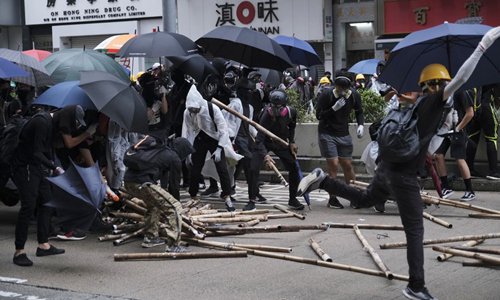HOME >> OPINION
American politicians’ separatist designs on Hong Kong will fail
By Tom Fowdy Source:Global Times Published: 2019/10/16 19:03:40

Rioters commit vandalism in Kowloon, Hong Kong on October 6. Photo: Xinhua
Over the weekend, US senators Ted Cruz of Texas and Josh Hawley of Florida visited China's Hong Kong Special Administrative Region and showed their support for activists on the ground, vowing to fight for the passage of the so-called Hong Kong Human Rights and Democracy Act in the US Congress (the lower house on Tuesday backed the bill, taking it closer to a law.) As they visited, the city descended into yet another weekend of violence and disorder as activists destroyed shops, property and threw Molotov cocktails. A policeman was also slashed in the neck with a knife.
The position and words of these senators should be taken with a pinch of salt. Claims of police brutality in the city, as well as the so-called control by Beijing, have been persistently and constantly exaggerated for political ends, failing to incorporate a bigger picture of events on the ground. This mass hysteria has long constituted an element of Hong Kong's political culture. Given this, the real goal of American politicians is to consolidate the city as an exclusive "hostile periphery" of China which is subsequently antagonistic to it. Nevertheless, Beijing's consistent emphasis on the country's territorial integrity and sovereignty ensures that not an inch can be given.
In recent weeks, radical protests led to all pervasive violence against businesses, institutions and organizations deemed associated with "Chinese mainland." Properties have been destroyed, individuals have been attacked, flags have been burnt and so on. Very few of these events have been highlighted by mainstream Western media, which largely contend that the protesters are justified and can do "no wrong."
The US knows this and in turn is seeking opportunities out of the chaos than sincere concerns for the city's wellbeing. Despite the fact that Hong Kong police have not killed, either directly or indirectly, a single protester, American politicians continue to perpetuate the misleading narrative, conjured by activists who are skilled in deception, that the police force is brutal and that Hongkongers are being "oppressed."
These events are in tandem with Washington ignoring far more violent crackdowns in other countries around the world. They illustrate Washington's selectivity and lack of sincerity. In doing so, they also willingly ignore the growing violence on behalf of the activists. As a result, it is not surprising that their narratives have formed the base position of Congress, who now may seek to pass an act which will have implications for the city's special status as a financial center. If this is selective and opportunistic, then what is the broader goal of the politicians backing it? In supporting these activists, which include an NGO funded in Washington DC and regular exchanges between Congress and leaders, the goal of many congressmen is not to simply uphold Hong Kong's autonomy but instead pursue the permanent differentiation of the city from the Chinese mainland. The long-term goal is to divide China and create a "hostile periphery." If the activists win, the city effectively becomes a unit which will never accept that it is part of China. It will not pursue unity or reconciliation with the mainland, but open antagonism and hostility toward it, aligning itself with the West.
In light of these intentions, Beijing's own position on the matter remains clear. The legacy of the century of humiliation, whereby China was subjugated and divided by external forces, has led to a strong emphasis being placed on the protection of sovereignty and territorial integrity against perceived foreign aggressors, as well as envisioning the broader unity of China. Since the founding of the People's Republic of China in 1949, this stance has been applied extremely consistently with red lines which have not shifted. As a result, Beijing perceives the movement in Hong Kong as a de facto separatist cause which is encouraged by American support.
Given this, China will not under any circumstances cede an inch on the matter of Hong Kong to the protesters and their Washington patrons. While Beijing remains committed to upholding the special privileges granted to Hong Kong as set out in the Sino-British Joint Declaration, nevertheless the statement that the city remains a part of the People's Republic of China and in turn ought to identify with such, is not up for negotiation.
Whether US Congress out of sheer political opportunism passes an act regarding the city or not, the outcome concerning this city's sense of belonging cannot be changed.
The author is a British political and international relations analyst and a graduate of Durham and Oxford universities. opinion@globaltimes.com.cn
Posted in: VIEWPOINT